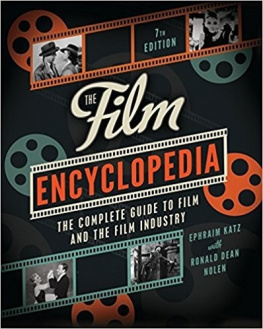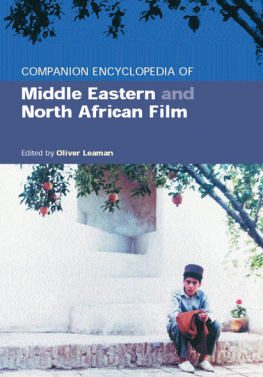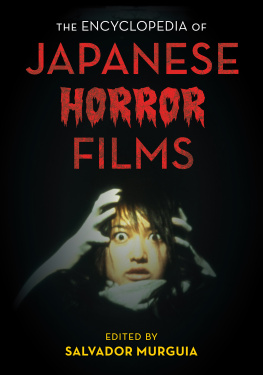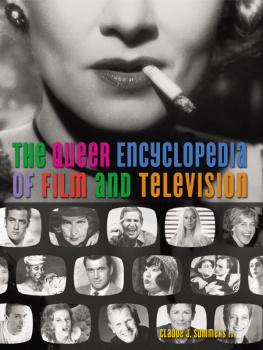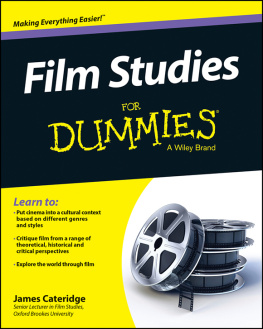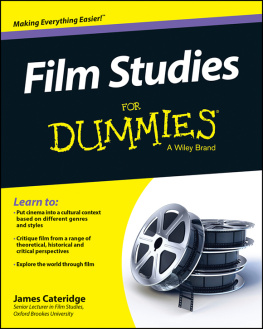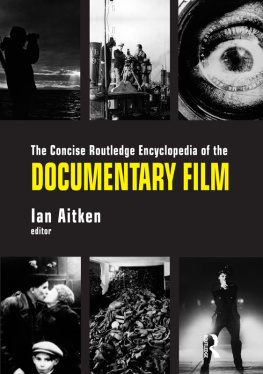
Contents
This work is a one-man project. It has taken many years to compile, and its scope has gradually expanded far beyond the original plan because of my desire to include much information that can be found elsewhere only in a wide variety of sources or that is treated sketchily in other works. My aim, in fact, was to make it the most comprehensive one-volume encyclopedia of world cinema ever published in the English language.
Every consideration has been given to the range and depth of material, even when this has meant sacrificing features that would have made the book superficially attractive. Although the publishers and I would like to have used photographs to enliven this text on one of the most visual of arts, we hope the reader will agree that omitting them was better than skimping on entries and information, which would have been necessary if photographs had been included. At my suggestion, the publishers have agreed to drop an entire category of subjectsthe factual and critical survey of specific motion pictures. Even a modest sampling of the thousands of notable films would have added hundreds of pages to this already hefty volume, and the selection would have been severely limited in both number of titles and information about them. We have, then, elected to disappoint the natural expectations of our audience rather than risk its protest with half-measures.
In the present volume I have concentrated on a broad range of entries about filmmakers and filmmaking with, I trust, a good balance of American, British, and international subjects. Country by country, the history of major film industries is covered from its inception to the present day. Important film-related organizations and events are discussed; inventions, techniques, processes, equipment, and technical terms are explained in language that is at once precise and easy to follow. The numerous biographies of directors, producers, screenwriters, cinematographers, art directors, composers, film editors, stars, and featured players are sufficiently rich in personal and professional details (including, in most cases, day of birth and education) to please both the film scholar and the movie fan. Complete filmographies accompany the entries of most directors and of all major stars. The film credits of other personalities are extensive and carefully selected to represent their most important work.
Looking back on the years I have invested in this volume, perhaps my most sobering discovery was that an open-ended ratio exists between one unit of fact and multiple units of time. For every hour of actual writing time that went into the preparation of the encyclopedia, I must have spent ten hours of researchchecking, cross-checking, and rechecking every fact in a great variety of sources in my own vast library and in outside facilities with film collections. I have tried, to the best of my ability, to resolve conflicts between sources of information and to correct factual distortions that have been perpetuated in film literature over the years. But in a work of this size, a degree of oversight is inevitable, and I beg the indulgence of the reader if, after all, some errors have crept in.
As with any work of magnitude, this encyclopedia was seen into print with the aid of many people, and I am indebted to all of them. My grateful thanks to members of the combined Crowell and Harper & Row editorial staffsparticularly Nicholas Ellison, Bernard Skydell, Leland Lowther, and Patrick Barrettwho were always at hand with practical help, good advice, and gentle spurs. I owe a very special acknowledgment to James Daly, who, over several years of devoted and meticulous care to the manuscript as editor/copyeditor, gained an invaluable overview of the work and saved me from many slips and inconsistencies. For help in confirming a prodigious array of facts, I am indebted to Naomi Ben-Gur, Julie Guibord, and Louise Spence. Finally, I thank my wife, Helen, for loving encouragement, intelligent help in research, and, above all, forbearance during the long years the work played hob with our lives.
Ephraim Katz
It is an honor to continue my long association with Ephraim Katzs The Film Encyclopedia. The book remains an invaluable basic resource, featuring many new faces and facts as well as the latest news about the creative forces that make up the rapidly changing world of cinema as it moves further into the digital age.
I continue to keep the promise of not eliminating any of the more than 8,000 entries. As always, it is sometimes necessary to tighten some existing entries in order to adhere to the finite number of pages the publisher is able to bind.
Many thanks to the libraries I routinely haunt and the institutions that continue to be so helpful, with a special nod to the Margaret Herrick Library of the Academy of Motion Picture Arts and Sciences, my parents Ron and Jane, Olive Moredock, Heidi Smith, my fellow film fanatic Scott Rollins out in the great state of Virginia and, most especially, the readers and fans of this work. It is my sincere wish that the end result lives up to the esteemed tradition of excellence created and inspired by the late Ephraim Katz.
As I write, it is 5:11 A.M. , January 23, 2011,... I suppose I am likely to always be a late-nighter, working into the wee hours. And so... another edition comes to a close.
For Kory and Kodi... you own my heart.
Ronald Dean Nolen
The subjects of the encyclopedia are presented in alphabetical order. There is, therefore, no index, but the text is liberally cross-referenced to direct the reader to all entries that contain related or complementary information. The cross-references are indicated with the use of small capitals: B ELUSHI; CLAPSTICKS; C INEMASCOPE .
In a biography, the heading FILMS indicates that what follows is a complete list of credits, either for the professional capacity given in the biography after the persons name or for the function specified in the filmography itself. A partial listing is headed FILMS INCLUDE. When it is not otherwise apparent, the national origin of a film, or the country in which it was produced, is shown by giving the countrys name after the title, in parentheses and usually abbreviated.
A slash separating titles in the credits means that what follows is an alternate title, in the same language as the original, in a second or third language for an international co-production, or for the release in a country other than that of origin. A slash used with country designations means that the film was a co-production of the two or more nations named.
Dates given with film titles are almost always the years of first release for general screening. For some films, however, the date reflects the year of a premiere (as when an American picture was screened near the end of a year to qualify it for the Academy Awards) or the year that the film was completed (as for some European films for which release dates could not be ascertained).
In some credits, a single film title is in most cases the title given the production in the country of origin. Whenever possible, original titles are given for pictures made in English, French, Spanish, Italian, and German. Titles of those made in less familiar languages (Swedish, Japanese, Russian, etc.) are those under which they have been released in the United States or in the United Kingdom. When no record of release in English-speaking countries is available, what is shown for a title in one of the unfamiliar languages is either a literal translation or the English rendering of an untranslatable title.
Most of the abbreviations in the film credits, as for countries, are common enough to be self-explanatory. The list below identifies those that might not be readily apparent.
Next page
